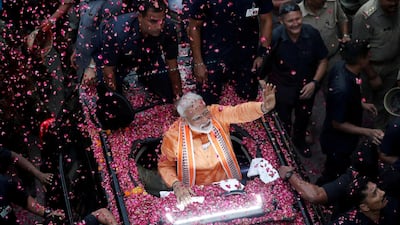A raft of exit poll results predict that Narendra Modi will return to power as India’s prime minister, although the alliance he heads might command a smaller parliamentary majority than the one that won him the office in 2014.
Exit polling agencies and television stations have been asking samples of citizens for their choices as they left voting booths in the nationwide election, conducted in seven phases over the last five weeks. India’s electoral rules prohibited these survey results from being published until Sunday evening, when the last leg of voting ended.
The news channel NDTV, averaging a host of published exit polls, calculated that the Bharatiya Janata Party (BJP) and its allies will win roughly 300 out of the 542 seats up for election. The opposition Congress party and its allies were expected to win about 127.
The predictions synced almost perfectly with the BJP’s own expectations. In a press conference two days ago, Amit Shah, the party president, cited the same round figure of 300.
In relative terms, this would be a slide for the BJP. Five years ago, Mr Modi stormed into office with his alliance of parties winning 336 seats.
His opposition, however, campaigned on the prime minister’s string of broken promises and his failure to reform the economy. Unemployment is high, economic growth has slowed, and the manufacturing and agriculture sectors have shrunk. Minorities have frequently found themselves victimised, to the point of violence and murder, by mobs claiming to espouse the Hindu-nationalist principles of the BJP.
Given these factors, as well as India’s well-known habit of voting incumbents out after a single term, the election was expected to be a harder-fought affair than the exit polls indicate.
On television channels on Sunday, analysts prefaced every discussion of these survey results with a disclaimer: that exit polls have often been wrong in the past, and frequently starkly so.
The BJP knows this only too well. In 2004, when the party was campaigning for a second term in power, it expected to win comfortably. The economy seemed to be booming, and all exit polls indicated a romp home. Instead, the Congress and its allies won, and served two successive stints in power before Mr Modi was able to revive his party.
That story repeats itself in variation. In 2009, only one agency showed that the Congress and its partners would secure more than 200 seats; it went on to win 262. More recent exit polls got the results wrong in state elections in Chhattisgarh and Bihar.
Methodologies may have evolved, but they never capture voter sentiment perfectly. Even in Australia on Saturday, the Liberal Party leader Scott Morrison bucked exit poll forecasts to win a new term in office. Mr Morrison seemed unable to believe it himself, calling his victory a “miracle”.
Sunday’s exit polls showed several internal divergences as well. In the battleground state of Uttar Pradesh – where 200 million of India’s 1.2 billion people live – one poll showed the BJP’s alliance winning just 22 out of 80 seats. Another showed them winning 51.
Raheel Khursheed, whose firm AnthroAI analysed words and sentiments put out across a range of public media – newspapers, social media, job boards, forums – in Uttar Pradesh, said that he believed the BJP would win 21 seats in the state. He allowed for a further margin of nine seats that may swing the party’s way.
That still represents a sharp dip from 2014, when the BJP famously won 71 out of 80 seats. “But it looks like they’ve apparently gained in Bihar, in Odisha, in Maharashtra, in West Bengal,” Mr Khursheed said. “So it isn’t making any difference if they’re losing seats in Uttar Pradesh.”
Uniformly, though, the polls presented a poor performance for the Congress – better than the 44 seats it managed in 2014, but still a long way from its heyday.
Spokespersons from the BJP celebrated the results of the exit polls, but other politicians dismissed them.
“I don’t trust exit poll gossip,” said Mamata Banerjee, the chief minister of West Bengal whose Trinamool Congress party is fiercely opposed to the BJP. “I appeal to all opposition parties to be united, strong and bold. We will fight this battle together.”
Ms Banerjee also hinted that the BJP was manipulating the results of voting by tinkering with the electronic voting machines used across the country.
Much may still change. The exit polls may have, once again, gotten it all entirely wrong. More crucially, given India’s Westminster system of parliament, governments are often formed or dissolved on the strength of party alliances.
These alliances may shift and reform over the next few days. Already on Sunday – coincidentally, as the finale of the episode of Game of Thrones was aired – signs emerged that parties will test new partnerships and jockey for power.
Mayawati, leader of one of the two big regional parties in Uttar Pradesh that had announced a pre-election alliance, will meet leaders of the Congress on Monday. The two factions had rejected any suggestion of a tie-up earlier, but they have in common an opposition to Mr Modi. The prospect of the BJP’s return to power may well encourage them to look past their previous acrimony.
But the arithmetic might nonetheless be unable to favour the Congress. In a television interview, Vivek Reddy, a BJP spokesman, voiced his party’s belief: “We can reject the possibility that the Congress and its allies are anywhere near forming the next government of India."

